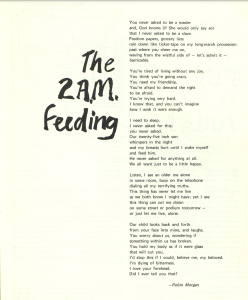
Published in Up From Under‘s February 1971 issue, Robin Morgan’s “The 2 A.M. Feeding” highlights a mother’s struggle with a newborn child. In this poem, Morgan describes the heterosexual socially-defined roles that constrain women.
During Second-Wave Feminism, feminists, especially feminist poets, questioned familial responsibilities defined by heterosexual roles. Prior to the Women’s Liberation Movement, society restructured the family unit to meet its capitalistic needs, making the sphere of domesticity inescapable. In the editorial statement of Up From Under’s February 1971 issue, the editors discuss these capitalistically-defined family roles that the movement hopes to change. As the editors describe “a man must meet the society’s need for a worker, which leaves him little time or energy to meet the emotional needs of a woman or children. The women’s role is to meet the man’s needs and the children’s needs” (Albert et al.4). The woman must come home to perform laborious house work and support her husband and children. On the other hand, her husband is expected to provide the financial support for his family, leaving him no time to nurture his children and support his wife. In the February 1971 issue, the editors feature Robin Morgan’s “The 2 A.M. Feeding,” which analyzes the implications of these roles. Opening the poem, the speaker bemoans “you never asked to be a master and, God knows…that I never asked to be a slave” (Morgan 36). Here, she addresses her husband as she describes the consequences of their societally-defined role. Even though her husband did not define the roles himself, he still remains in control. The speaker lives at the mercy of her husband and children’s desires. She bewails, “I need to sleep. I never asked for this; you never asked. Our twenty-five inch son whimpers in the night and my breasts hurt until I wake myself and feed him” (Morgan 36). A mother must prioritize the needs of her children in the way a father does not need to prioritize them. She has responsibilities that her husband cannot help her with, but these responsibilities are considered her duty and go unrecognized. Without a mother’s sacrifices society would not exist, yet society refused to recognize them in any tangible manner.
Sources:
Albert, Marilyn, et al., editors. Up From Under, vol. 1, no. 3, 1971, pp. 1–69.
Morgan , Robin. “‘The 2 A.M. Feeding.’” Up From Under, vol. 1, no. 3, ser. 1, 1 Feb. 1971, pp. 36–36.
